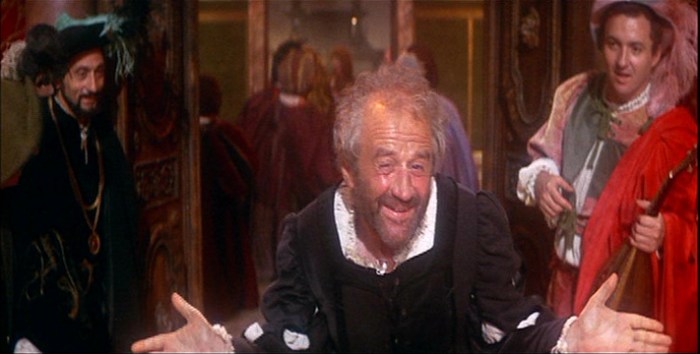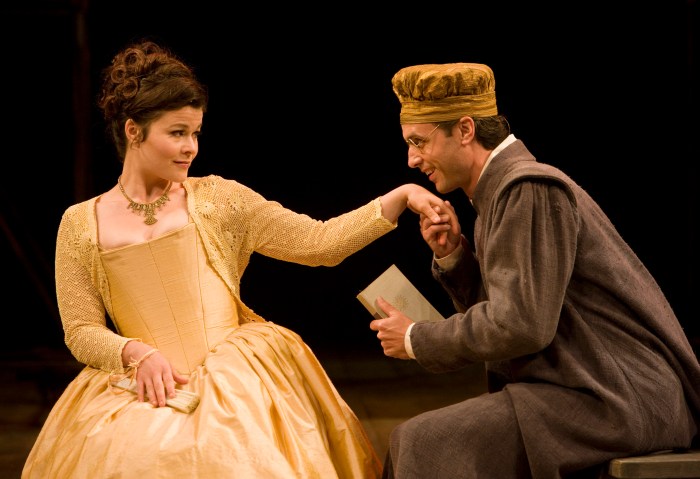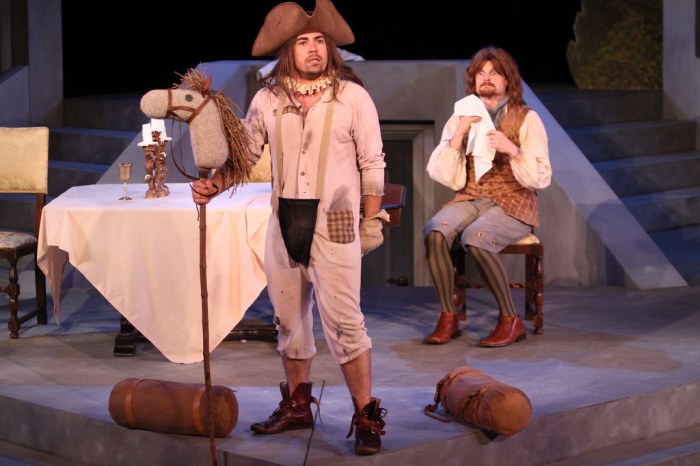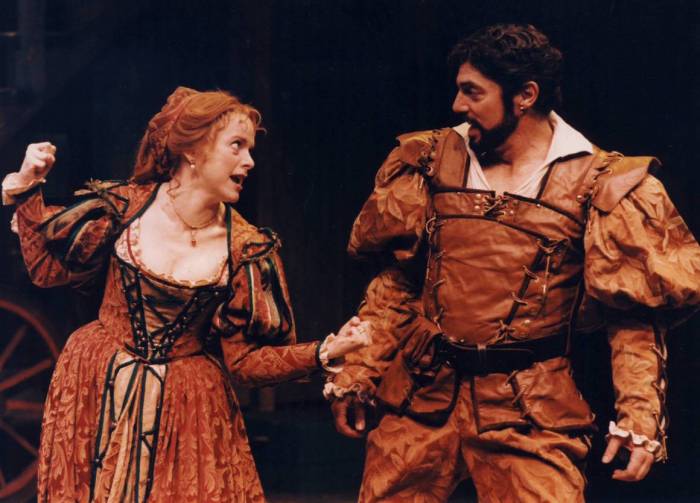Grumio taming of the shrew – In Shakespeare’s witty comedy “The Taming of the Shrew,” Grumio, Petruchio’s loyal servant, emerges as an unsung hero. This engaging analysis explores Grumio’s multifaceted character, his pivotal role in Petruchio’s taming strategy, and his significant contribution to the play’s humor and cultural relevance.
Grumio’s low social status and humble occupation as a servant belie his sharp wit, unwavering loyalty, and comedic flair. His interactions with other characters, particularly Petruchio and Kate, reveal a keen understanding of human nature and a talent for manipulating situations to his advantage.
Grumio’s Character and Role

Grumio is a minor character in Shakespeare’s The Taming of the Shrew. Despite his limited stage time, he plays a significant role in the play’s comic subplot.
Social Status and Occupation
Grumio is a servant in the household of Petruchio, the protagonist of the play. His social status is low, and he is often treated with disdain by his master and other characters. However, Grumio is a clever and resourceful servant who is able to outwit his superiors on several occasions.
Personality Traits and Demeanor
Grumio is a witty and sarcastic character who is not afraid to speak his mind. He is also a loyal servant who is devoted to Petruchio, even though he often complains about his master’s脾气.
Interactions with Other Characters
Grumio has several memorable interactions with other characters in the play. One of his most famous scenes is with Petruchio, in which he complains about the food and lodging at Petruchio’s country house. Grumio also has several scenes with Kate, Petruchio’s wife.
In these scenes, Grumio often tries to outwit Kate, but she usually gets the better of him.
Grumio’s Relationship with Petruchio: Grumio Taming Of The Shrew
Initially, Grumio is skeptical and apprehensive about Petruchio’s unconventional plan to tame Kate. He fears that Petruchio’s harsh treatment will only worsen Kate’s temper.
However, as the play progresses, Grumio’s attitude towards Petruchio gradually shifts. He witnesses firsthand the effectiveness of Petruchio’s methods, and he begins to admire Petruchio’s determination and cunning.
Grumio’s Contribution to Petruchio’s Success
Grumio plays a crucial role in Petruchio’s success in taming Kate. He serves as Petruchio’s loyal and resourceful servant, providing him with practical support and advice.
- Practical Assistance:Grumio helps Petruchio with various practical tasks, such as finding a suitable house for the newlyweds and arranging for their meals.
- Emotional Support:Grumio provides Petruchio with emotional support, encouraging him to stay firm in his resolve and offering him comic relief when things get tough.
- Strategic Advice:Grumio offers Petruchio valuable strategic advice, such as suggesting that he starve Kate into submission and that he publicly humiliate her by making her wear ridiculous clothing.
Grumio’s Role in the Play’s Humor

Grumio is a vital source of comic relief in The Taming of the Shrew. His character and actions are infused with a blend of physical comedy and verbal wit that contribute significantly to the play’s humorous tone.
Physical Comedy
Grumio’s physicality is a major element of his humor. His clumsiness, exaggerated gestures, and facial expressions create a series of hilarious moments. For instance, in Act II, Scene I, Grumio’s attempts to describe Petruchio’s wedding attire are accompanied by a series of pratfalls and mishaps that evoke laughter from the audience.
Verbal Wit
In addition to his physical comedy, Grumio is also a skilled wordsmith. His witty remarks, puns, and malapropisms add to the play’s comedic elements. Grumio’s clever use of language often provides a satirical commentary on the characters and events of the play.
For example, in Act III, Scene II, Grumio’s description of Petruchio’s “taming” methods as “a kind of harsh discipline” is a humorous understatement that highlights the play’s themes of gender roles and power dynamics.
Specific Scenes
Grumio’s humor is particularly effective in scenes where he interacts with Petruchio. The contrast between Petruchio’s authoritarian nature and Grumio’s mischievousness creates a series of comedic moments. For example, in Act IV, Scene I, Grumio’s attempts to outsmart Petruchio in the “wife-taming” contest are a highlight of the play’s humor.
Grumio’s Importance in the Plot

Grumio plays a pivotal role in the plot of The Taming of the Shrew, contributing significantly to the play’s central conflict and resolution.
Grumio’s taming of the shrew is a key moment in the play, as it shows his determination to bring Katherina under control. However, in act 5 , Grumio’s methods are put to the test when Katherina refuses to obey him.
Despite this, Grumio remains resolute, and his eventual success in taming Katherina is a testament to his patience and determination.
Grumio’s Role in Setting Up the Main Conflict
Grumio’s initial interactions with Petruchio establish the play’s main conflict by highlighting Katherina’s shrewish nature and Petruchio’s determination to tame her.
- Grumio’s description of Katherina’s violent temper and refusal to marry any man creates a negative impression of her.
- His account of Petruchio’s eccentricities and unconventional approach to courtship sets the stage for the clash between the two characters.
Grumio’s Actions and the Development of the Plot
Grumio’s actions throughout the play contribute to the development of the plot in several ways:
- He helps Petruchio execute his plan to tame Katherina by providing him with information about her habits and weaknesses.
- His loyalty to Petruchio leads him to participate in the elaborate schemes to subdue Katherina, such as the wedding day antics and the household chaos.
- His witty observations and humorous commentary on the events provide a comic relief that balances the play’s more serious moments.
Grumio’s Impact on the Play’s Resolution
Grumio’s presence is crucial to the play’s resolution as he witnesses and facilitates the transformation of Katherina and Petruchio’s relationship.
- His reports on Katherina’s gradual submission to Petruchio’s authority provide evidence of her change.
- His participation in the final scene, where Katherina delivers her famous speech on wifely obedience, highlights the success of Petruchio’s taming efforts.
- His presence serves as a reminder of the journey that Katherina and Petruchio have undertaken and the challenges they have overcome.
Grumio’s Cultural Significance

Grumio’s character in “The Taming of the Shrew” reflects the social and cultural norms of his time. He is a servant who is subservient to his master, Petruchio. Grumio’s relationship with Petruchio highlights the hierarchical nature of Elizabethan society, where social status and authority were clearly defined.
Historical Context
During the Elizabethan era, servants like Grumio were common in wealthy households. They were expected to be obedient and respectful to their masters, and their lives were often filled with hard work and little reward. Grumio’s character embodies this social reality, as he is frequently berated and mistreated by Petruchio.
Interpretation and Adaptation, Grumio taming of the shrew
Over time, Grumio’s character has been interpreted and adapted in various ways. In some productions, he is portrayed as a comic figure, providing humorous relief from the play’s more serious moments. In other interpretations, Grumio is seen as a more complex character, who is both loyal to his master and critical of his behavior.These
different interpretations reflect the changing social and cultural values over time. In the 19th century, for example, Grumio was often seen as a buffoonish figure, while in more recent productions, he has been portrayed with greater depth and sympathy.
FAQ
What is Grumio’s primary function in the play?
Grumio serves as Petruchio’s loyal servant and confidant, aiding him in his plan to tame Kate.
How does Grumio contribute to the play’s humor?
Grumio’s physical comedy, witty remarks, and clever manipulation of language provide a significant source of humor throughout the play.